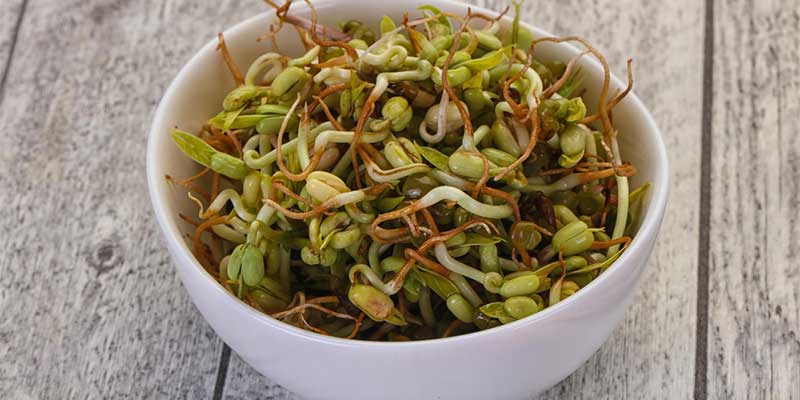Sprouts Protein Per 100g
Sprouts are tiny but mighty, often hailed as a superfood for their impressive nutrient profile. They are essentially seeds that have germinated and grown into young plants, and this process significantly enhances their nutritional content.
Among the many benefits sprouts offer, one of the most important is their protein content.
This blog post will explore how much protein sprouts provide per 100 grams, the types of sprouts that are best for protein, and why they should be a staple in your diet.
| Quick Summary |
| 100 grams of sprouts, like mung bean sprouts, contain approximately 3 grams of protein, offering a light, nutritious protein source. |
What Are Sprouts?
Sprouts are young shoots that emerge when seeds begin to grow, a process known as germination. Common seeds that are sprouted include legumes (like mung beans and lentils), grains (such as quinoa), and vegetables (like alfalfa and broccoli).
During the sprouting process, the nutrient levels in these seeds, especially protein and vitamins, increase significantly, making them more bioavailable and easier for the body to absorb.
Protein Content in Sprouts per 100g
The protein content of sprouts can vary depending on the type of seed from which they are grown. Here’s a look at the protein content in some of the most popular types of sprouts:
-
Mung Bean Sprouts: Approximately 3.0 grams of protein per 100 grams. Mung bean sprouts are one of the most commonly consumed sprouts, known for their crisp texture and slightly nutty flavor.
-
Lentil Sprouts: Around 9.0 grams of protein per 100 grams. Lentil sprouts are highly nutritious and offer a higher protein content compared to many other sprouts.
-
Alfalfa Sprouts: Approximately 4.0 grams of protein per 100 grams. Alfalfa sprouts are popular for their mild flavor and are often added to salads and sandwiches.
-
Broccoli Sprouts: About 2.8 grams of protein per 100 grams. Broccoli sprouts are rich in sulforaphane, a compound known for its potent anti-cancer properties, alongside their protein content.
-
Quinoa Sprouts: Around 4.0 grams of protein per 100 grams. Quinoa sprouts are a complete protein source, containing all nine essential amino acids, making them particularly valuable in a plant-based diet.
Why Sprouts Are a Nutritional Powerhouse
Beyond their protein content, sprouts offer a wide array of health benefits:
-
Rich in Vitamins and Minerals: Sprouts are packed with essential vitamins like vitamin C, vitamin K, and various B vitamins. They also provide minerals such as iron, magnesium, and zinc, which are crucial for overall health.
-
High in Enzymes: The sprouting process increases the enzyme content in seeds, which aids in digestion and enhances nutrient absorption. These enzymes can help your body break down food more efficiently, promoting better gut health.
-
Low in Calories: Sprouts are low in calories but high in nutrients, making them an excellent addition to a diet aimed at weight management or simply increasing nutrient intake without adding excess calories.
-
Rich in Antioxidants: Sprouts are a good source of antioxidants, which help combat oxidative stress and reduce inflammation in the body. This can lower the risk of chronic diseases like heart disease and cancer.
-
Supports Digestive Health: The high fiber content in sprouts aids digestion and helps maintain a healthy gut microbiome. They are also easier to digest than their unsprouted counterparts due to the breakdown of complex starches during sprouting.
How to Incorporate Sprouts into Your Diet
Sprouts are incredibly versatile and can be added to a variety of dishes. Here are some ideas:
-
Salads: Add a handful of mixed sprouts to your salads for an extra crunch and a boost of protein.
-
Sandwiches and Wraps: Sprouts make a great topping for sandwiches and wraps, adding freshness and texture.
-
Smoothies: Blend sprouts like alfalfa or broccoli into your smoothies for a nutrient-rich boost without altering the flavor too much.
-
Stir-Fries: Add mung bean or lentil sprouts to your stir-fries in the last few minutes of cooking to maintain their crunch and nutritional value.
-
Sprouted Grain Bread: Use sprouted grains to make bread, which is not only more nutritious but also easier to digest than traditional bread.
Conclusion
Sprouts, while small, pack a significant nutritional punch, especially when it comes to protein content. Depending on the type, sprouts can provide a good amount of protein per 100 grams, making them an excellent addition to any diet, particularly for vegetarians and vegans.
Whether you're looking to enhance your protein intake or simply add more nutrient-dense foods to your meals, sprouts are a versatile, delicious, and highly beneficial option.
So the next time you're at the grocery store or planning your meals, consider adding sprouts to your cart—they might be small, but their impact on your health can be enormous.


